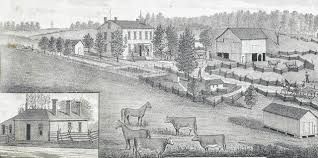Healthy Roots are Essential to a Healthy Nation
Power in our nation is designed to flow from the bottom (the roots) up. Our founding documents make this clear:
My daughter noticed some brown spots in her yard and skunks soon began digging up big tufts of dead grass. Most likely, grubs had infested the yard, killed the grass at the root level, and the skunks came to feast on the grubs. Healthy roots are essential to a healthy plant!
The same is true of our nation! In the political realm, the term "grassroots" refers to the concept of ordinary citizens at the local level being in charge of our nation as opposed to political elites, or institutions. Founded as a constitutional, representative republic, our nation is designed to be in the hands of “We the People”. Power in our nation is designed to flow from the bottom (the roots) up. Our founding documents make this clear:
The Declaration of Independence (1776)
“We hold these truths to be self-evident…governments are instituted among men, deriving their just powers from the consent of the governed.”
The U.S. Constitution (1787)
“The powers not delegated to the United States by the Constitution, nor prohibited by it to the states, are reserved to the states respectively, or to the people.”
The grassroots metaphor is unmistakable in our founding documents. Elizabeth Willing Powel, at the close of the Constitutional Convention in 1787, asked Ben Franklin what form of government we had, “a republic or a monarchy”? Franklin replied “A republic, if you can keep it”.
Franklin knew the danger. He was warning that the newly formed United States was a constitutional republic, not a pure democracy or monarchy, and that its survival depended on the “active engagement” of its citizens. Few would argue that civic engagement in our nation, state, county, and municipalities is where Ben Franklin would want it to be. We must do better!
We must push back on the self-defeating notion that local politics, and civic engagement, does not matter! Sure, we elect people to represent us in Columbus and DC, but they will tell you that “local elected representatives” can be very influential in how they represent us.
Township Trustees have state and national associations who try to influence policies in Columbus and DC. The same is true for County Commissioners, County Auditors, Village & City Mayors, and just about every other local elected office. How your “local” elected officials represent you in those state and national associations matters greatly! Our conservative, Shelby County, voice needs to be heard if our values will help shape policies at the state and national level.
We should also view local elected office as a potential “farm team” where future candidates for higher office are developed. We must elect the right people at the local level to feed in to this pipeline of future candidates. Unfortunately, the elections where these people are selected have extremely low voter turnout.
There is a four-year election cycle in Ohio. Starting with the most recent Presidential Election year, that cycle follows this general four-year pattern:
(Year 1) March 2024 Primary Election allows each political party to elect their nominees for President & Vice President and for offices in the U.S. Senate, U.S. House, Ohio General Assembly, and some county offices.
(Year 1) November 2024 General Election for President and Vice President; U.S. Senate; U.S. House of Representatives; Ohio General Assembly; Ohio Supreme Court; County Commissioners (2 of 3), and a Statewide Ballot Measure.
(Year 2) May 2025 Primary Election (if needed).
(Year 2) November 2025 General Election for Township Trustees (2 of 3); a Township Fiscal Officer; Village Council Members; School Board Members; and some Municipal Offices.
(Year 3) March 2026 Primary Election to select party nominees for state and federal offices.
(Year 3) November 2026 General Election to elect members of the U.S. House; U.S. Senate (1 of 2); Ohio’s statewide offices of Governor, Lieutenant Governor, Attorney General, Secretary of State, Treasurer, & Auditor; all 99 Ohio House seats; and half of the 33 Ohio Senate seats; Ohio Supreme Court justices, appellate judges, some local judges; and County Commissioners (2 of 3).
(Year 4) May 2027 Primary Election will be similar to 2025, with nonpartisan primaries for local offices, and possible partisan primaries for special elections.
(Year 4) November 2027 General Election for 1 of 3 Township Trustees (1 of 3); possibly a Township Fiscal Officer; Village Council Members; School Board Members; and some Municipal Offices.
Each of these eight elections are important. Ben Franklin, and our other founding fathers, would certainly have expected all of us to participate in all of them, as well as any other special elections called as needed. He told Ms. Powel that we have a republic, if we can keep it! Civic engagement (voting) is not optional if we want to keep our Republican form of government!
The drop-off in civic engagement is not unique to Shelby County. It is a nationwide problem. But the revolution has to start somewhere, so why not right here in Shelby County? Let’s commit to showing other counties around our state and nation how Ben Franklin expected it to be done. Let’s work together to make grassroots civic engagement cool again!
Voter registration deadline for the upcoming election: October 6, 2025
Early in-person voting begins: October 7, 2025 at the Board of Elections
Election Day is: November 4, 2025
Make your plan to vote, because healthy roots are essential to a healthy nation!
Late addition: Less that 24 hours before the deadline for this article, Charlie Kirk, a 31-year-old Christian, husband, father, and conservative icon, was assassinated while debating ideas with students on a college campus in Utah. His “crime” was civic engagement! Please pray for Charlie’s family and for our nation. And honor Charlie’s life and legacy by ramping up your own grassroots civic engagement.



